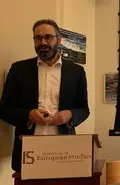Voluntariness and Repatriation. Transnational Processes of Remigration and Repatriation (1960–2000)
Duration
10/2020
- 09/2023
Project management

Main project
- Research Group "Voluntariness" Prof. Dr. Jürgen Martschukat
Related projects
My goal is to analyze the impact of this repatriation regime at three different levels. First, international organizations specialized in the implementation of state repatriation programs. The key question here is to what extent these organizations established voluntary return as a norm and embedded it as a principle in international law.
At a second level, I explore how non-governmental organizations and civil society groups helped shape the discourse on voluntary return, examining whether they embraced or opposed this discourse. While some of them adopted and actively promoted the discourse of voluntariness, others problematized the direct connection between forcible deportation and offers of voluntary return, engendering a sensitivity to the antinomies of voluntariness.
Third, I foreground the migrants themselves. Labor migrants, refugees, and asylum seekers alike faced the possibility of voluntary return, though their previous migratory experiences were quite different. With regard to these three groups of migrants, the subproject seeks to determine the extent to which they accepted the voluntariness of their own return, declared it voluntary themselves, or even deployed voluntariness as a technique of self within the repatriation process.
The subproject brings out the way in which, alongside normative and discursive elements, practical conditions shaped decisions about, and explanations of, voluntariness. Drawing on archival material, sociological studies, and interviews with migrants, I investigate processes of subjectification and agency (or Eigen-Sinn) within repatriation regimes through a historical lens.
